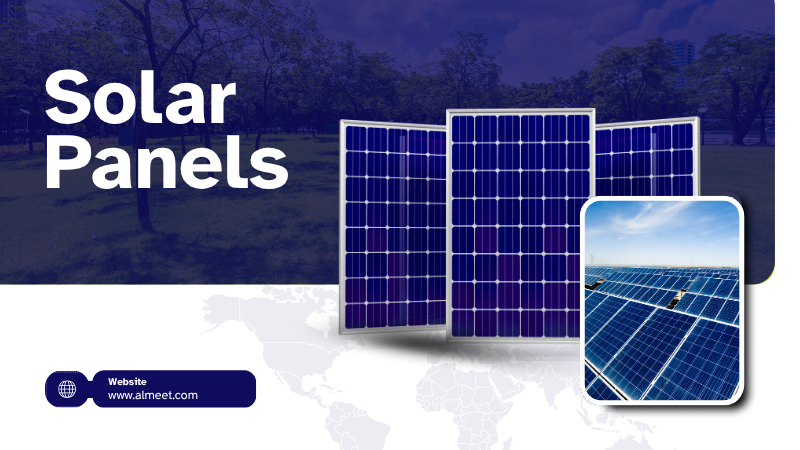Top Solar Panels for Your Home: How to Choose, Install, and Save on Energy Costs

With the energy price hikes on the horizon and the growing clamor for eco-friendly solutions, many homeowners are relying on solar panels as a means to cut their carbon footprint and save on power bills. But how exactly do you find the best solar panel for your home? There are many variables—installation cost, panel technology, and efficiency. No matter if you’re interested in installing a do-it-yourself (DIY) solar panel kit for your home or if you’re evaluating the high-tech Tesla solar panels, we’ve got you covered in this comprehensive and detailed guide all about solar panels.
What Are Solar Panels?
Solar Panels Solar panels, also known as photovoltaic (PV) panels, are pieces of equipment designed to convert light into power. They consist of multiple solar cells that actually perform the conversion. When the light of the sun strikes the cells, it excites the electrons and creates a flow of electricity. This is known as the photovoltaic effect.
Why Opt for Solar Panels in Your Home?
Solar power is a clean source of renewable energy and helps homeowners to become less reliant on grid electricity. Here’s just a handful of the main ones driving the shift:
Saving Money: You will see a serious reduction in your electricity bill if you replace power-hogging light bulbs with the energy-efficient solar panel.
Environmental Impact: You are making a contribution to the planet by using the sun.
Raise Home Value: Homes with solar frequently sell for more than homes without solar.
Energy Independence: Solar enables you to take control of your energy.
Solar Panel Types: What Is the Best Solar Panel for Your Home?
When researching and choosing the perfect solar panel for your home, you need to take into account a handful of tips and interests to ensure you are making a successful decision. Let’s dissect the most popular solar panels:
Monocrystalline Solar Panels
Monocrystalline panels are known for their high efficiency and the sleek all-black look. The panels are crafted from a single crystal structure, meaning they are more efficient at converting sunlight to electricity than other kinds of panels.
Pros:
High-efficiency models (usually range from 15 to 20%).
Longer lifespan (25+ years).
Great low-light performance.
Cons:
More expensive than other panels.
Polycrystalline Solar Panels
Polycrystalline panels are composed of silicon crystals that are melted together. These are less expensive but also a bit less efficient than monocrystalline panels.
Pros:
Lower cost.
Good performance in sunlight.
Cons:
Less efficient (commonly 13-16%).
Not as long-lasting as monocrystalline units.
Thin-Film Solar Panels
They are also a good fit for ‘lightweight’ and flexible designs, but not all installations. But they are the least energy-effective of the three kinds.
Pros:
Lightweight and flexible.
Cheaper manufacturing costs.
Cons:
Lower efficiency (10-12%).
More room is needed for the same power.
How Do Solar Panels Work?
To understand how solar panels work, imagine that they’re a bunch of tiny power plants on your roof. The cells buried within solar panels absorb sunlight and convert that into DC electricity. An inverter then changes this DC electricity into the alternating current (AC) electricity you use to power devices in your home.
Electricity produced by your solar provides power straight to your home appliances or to recharge batteries for use later and lowers grid dependency.
How to Install Solar Panels: A Step-By-Step Guide
Having solar panels in your home is a great investment. Here’s a little how-to guide to get it installed:
Site Assessment and System Design
The first step is to inspect your roof to make sure it can accommodate solar panels. The system’s performance is also influenced by factors such as the roof pitch, shade, and direction of the sunlight. All of these design considerations will be evaluated by a solar installer and used to design a system customized for your home.
Permits and Paperwork
You should prepare the appropriate permits required from your local jurisdiction before planning to install this in your house. In some places there are incentives and rebates for solar modules, so be sure to look around for the best deal.
Solar Panel Installation
Once all that is set, the solar installer will be on your roof, securing the solar panels and making sure everything is properly wired and connected. This process might take a day or three, depending on the size of your setup.
System Activation
Once the system is installed, your system will be tested to prove that it is working. Your panels will start producing electricity for your house as soon as you start them.
Solar Panel Installation Costs: What Does It Cost to Install Solar Panels?
Depending on the system size, panel type, and your location, the cost of installing solar panels can vary. The cost of an entire solar system, including panels, an inverter, and installation, on average, runs between $10,000 and $30,000, depending on the size of the home.
Reasons for Variations in the Cost of Solar Panels:
Panel Type: More efficient panels, such as monocrystalline, cost more.
System Size—The larger the system, the more expensive it will be.
Location: Prices vary by location due to regional solar incentives and installation costs.
Is Solar Panel Installation a Saving You Can Bank On?
Yes! Initial Installation The installation can be quite expensive but can provide significant energy savings over time. Some homeowners recoup their investment within 5-10 years based on their location and energy consumption.
Advantages of Solar Panels for Your Home
Here are some of the benefits of solar power for you to consider if you’re thinking about making the switch. Here’s one reason you might want to consider your own home:
Environmental Impact
Solar power is clean energy. Reducing your carbon footprint and lessening your environmental impact is never a bad thing, and if you can save money at the same time, well, that's just great!
Energy Savings
How much will solar panels cut your electricity bill? The energy savings from the sun, once the installation costs are paid, can help you recover your investment.
Tax Incentives and Rebates
A number of governments also provide incentives, tax breaks, and subsidies for homeowners who install solar panels. These materials can cut down on the expense of an initial installation.
Increased Home Value
Homes with solar panels are considered more valuable and will likely command a higher price in the market. Solar panels may even make your home more attractive to environmentally conscious buyers.
Challenges of Solar Panels
While there are many pros to solar panels, there are also some cons:
Upfront Cost
Installation can be costly up-front. But there are ways to defray the cost of that system, including financing options and rebates.
Weather Dependence
Solar panels need sunlight to create power, so they might not be as effective on cloudy days and at night.
Maintenance
Solar installations are relatively maintenance-free but require some cleaning to maintain output.
Future Trends in Solar Panels
The future for solar panels seems bright as they gain efficiency and legality courtesy of the many advancements in technology. Here are a few of the big trends to watch:
Solar Roofs: Companies such as Tesla are working on solar roof tiles that look as follows and integrate directly into the construction of your home.
Energy Storage: As batteries improve, homeowners are able to store the energy they generate for use when that energy generation isn’t possible.
Bifacial Solar Panels: These solar panels take in sunlight from both the front and rear and hence produce more energy.
Conclusion
Putting solar panels on your roof is a solid investment for you, your home, and the environment. With the right information, you’ll be able to decide which panels are best for you — whether those are the Tesla model, solar panel kits, or something else. Don't wait — bring the power of solar today and begin saving on your energy bill while you also save the environment.
Ready to reduce your carbon footprint and save on energy bills? Join us today at almeet.com to explore the best solar panel options for your home and make the switch to clean, renewable energy!
FAQs
What is the life expectancy of solar panels?
Most solar panels will last 25 to 30 years, and many manufacturers will guarantee this with a warranty of 20 to 25 years.
What is the price for solar panel installation?
Costs are between $10,000 and $30,000, depending on system size and panel type.
Do I need batteries to go with my solar panels?
Though not required, solar batteries can store extra energy for future use, therefore making your system more productive.
How do solar panels function in cloudy conditions?
Solar panels can still produce energy from cloud cover, but it’s less effective. They produce power depending on how much sunlight you get, even on a cloudy day.
Are there any solar tax credits, grants, or incentives available?
Yes, there are rebates and tax credits provided by many governments to encourage homeowners to get solar.








